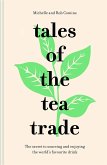In Egypt, hibiscus tea, known as "Karkadeh," is traditionally served during festivals and special occasions. Egyptians value the drink not only for its delightful tart flavor but also for its potential health benefits, including its use as a natural remedy for high blood pressure and other ailments. Over time, Karkadeh has become a symbol of hospitality, often enjoyed by locals and visitors alike. This cultural appreciation has laid the groundwork for hibiscus tea's integration into daily life, showcasing its importance beyond mere refreshment.
Dieser Download kann aus rechtlichen Gründen nur mit Rechnungsadresse in A, B, CY, CZ, D, DK, EW, E, FIN, F, GR, H, IRL, I, LT, L, LR, M, NL, PL, P, R, S, SLO, SK ausgeliefert werden.









